Arctic visitors in Irish waters and the dark side of dolphins
- Published
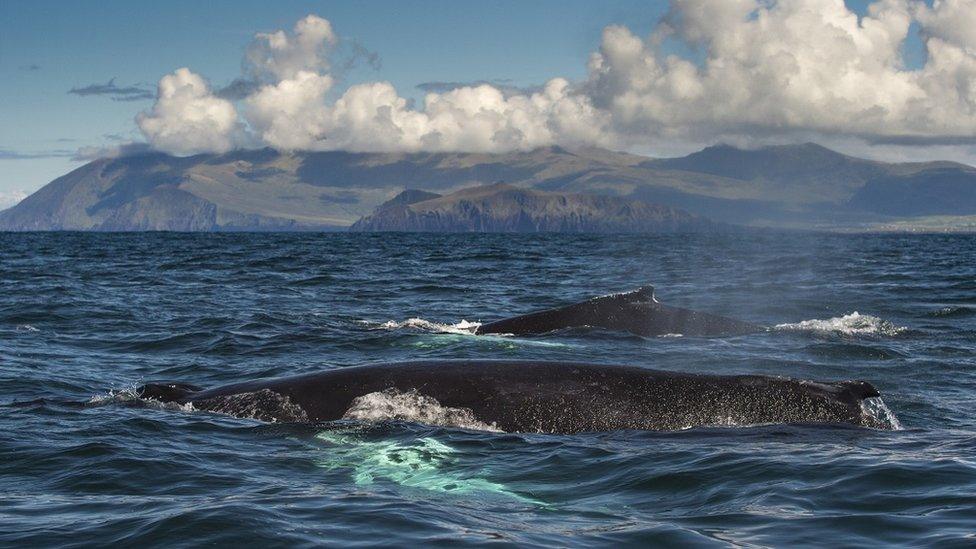
Humpback whales off the coast of County Kerry
More and more species of whales and dolphins are being recorded in Irish waters, a group that monitors the mammals has said.
Pádraig Whooley, of the Irish Whale and Dolphin Group (IWDG), said it was an "exciting time" to be studying them.
The group lists more than two dozen species, external which can be found in Irish waters.
"We are recording more new species," Mr Whooley said.
"The likes of Beluga whales, the white whale from the Arctic - the last Beluga whales we had were off Dunluce Castle in 2015.
"We've also had a Bowhead whale at the mouth of Carlingford Lough.
"These are animals that live on the edge of the Arctic ice and it makes absolute sense that as the ice is fragmenting that Arctic populations may also fragment.
"If you live up at the top of the world you can't go any further north, there's only one way you can go if your population is going to move and that's south."
He added that there had been "an amazing run of walrus in the last two or three years."
Mr Whooley cited last weekend as typical in terms of sightings, with, in Northern Irish waters alone, bottlenose dolphins seen off the coast of Donaghadee, basking sharks off the Skerries near Portrush and a Minke whale in the Fairhead area.
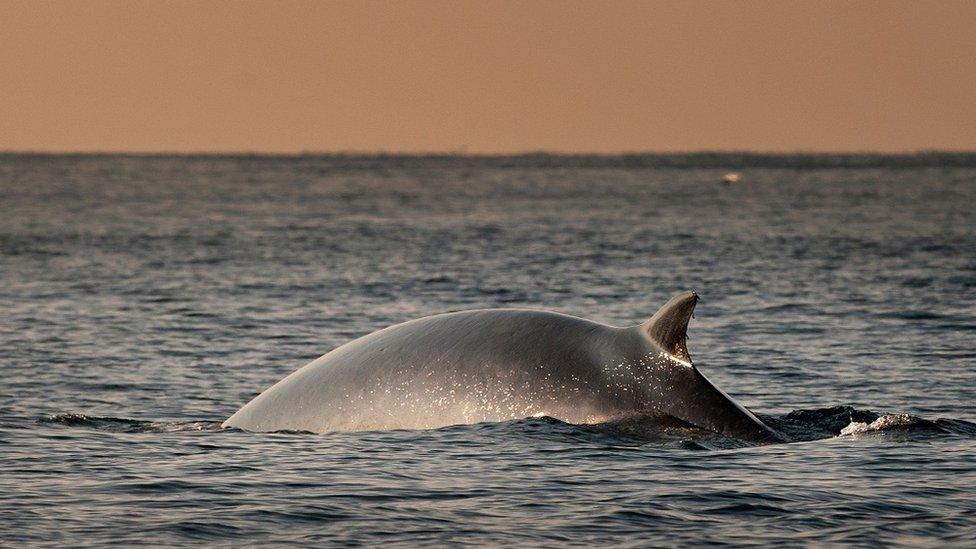
Fin whales, than can grow to over 20 metres in length, are also found in Irish waters
"I meet people who've gone whale watching in Hermanus in South Africa, they've been to Patagonia in Argentina, they've been to British Columbia, Hawaii, Mexico," Mr Whooley said.
"They go whale watching around the world and I'd say to them: 'Did you ever sit up on an Irish clifftop?' And they'd say: 'No we'd never do that, what would we do that for?'
"We've got some of the best land-based whale watching on the planet."
Mr Whooley said Ireland is a prime destination for whales, particularly Minke, humpback and fin.
"We always posed the question, was Ireland just a roadside café, a quick stop on a journey somewhere else or was Ireland actually the destination?
"You'd have to say, as the years go by, that Ireland is increasingly looking like a destination in and of itself, a feeding destination," he said.
'A spectacular place'
Colin Barnes runs a whale-watching boat off the coast of west Cork.
He agrees that Ireland can rival anywhere in the world for seeing whales and dolphins.
"There are very few places where you have a sporting chance of seeing three species [of whale] like we have here," he said.
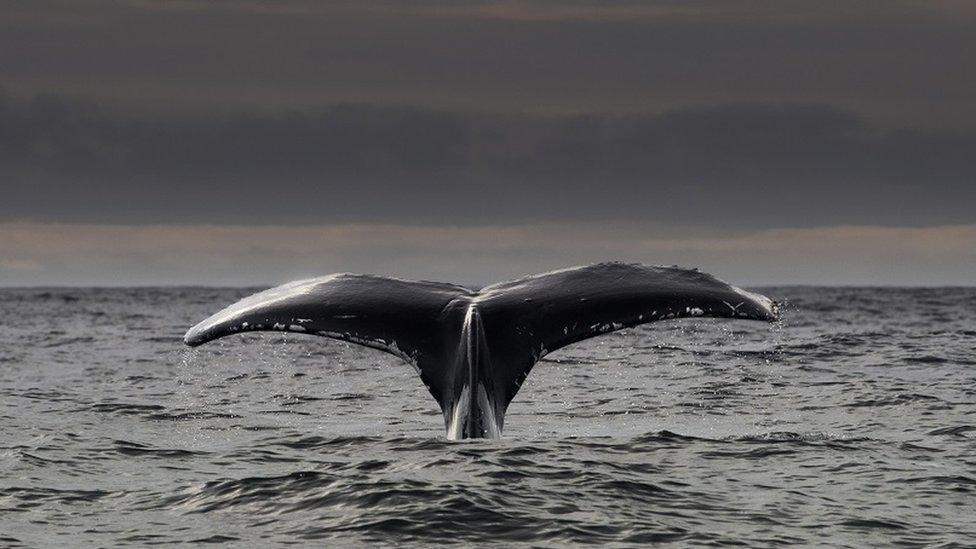
Ireland is a prime feeding destination for whales such as this humpback
"The patch of water we're in is a spectacular place for cetaceans, we haven't done a blank trip for years and years, we always find some."
Mr Barnes said some of the whales can get up close and personal during the boat trips.
"Three or four times we've had humpbacks come up and visit the boats for more than an hour and just show off," he said.
"Experiences like that come rarely."
The dark side of dolphins
Even more common than whales in Irish waters are dolphins and porpoises.
While dolphins are among the most beloved of sea creatures, a recent incident in Strangford Lough shows they can have a darker side.
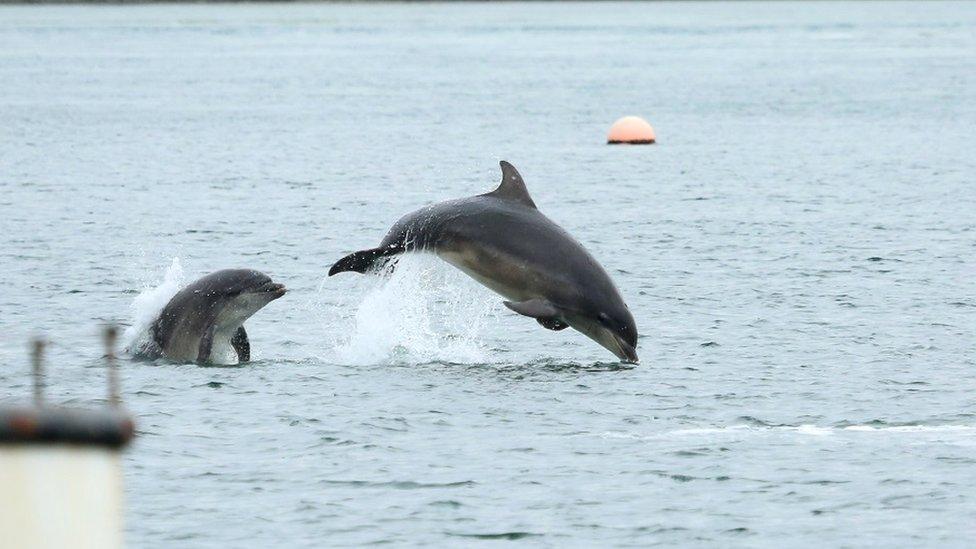
Bottlenose dolphin were photographed recently in Strangford Lough in County Down
Two bottlenose dolphins were seen in the lough over a number of days and on the third day footage seemingly showed them playing with a third dolphin.
"But they weren't playing with another dolphin, they were attacking and killing a harbour porpoise and this is something that bottlenose dolphins do quite routinely," Mr Whooley said.
"People are absolutely horrified because they think, dolphins - aren't they supposed to be cute and cuddly?
"We've been saying for 30 years, dolphins and in particular bottlenose dolphins, which are definitely a species on the increase in Northern Ireland, have a dark side.
"They're big mammals and like lots of big mammals they kill lots of things and they're not even going to eat it."
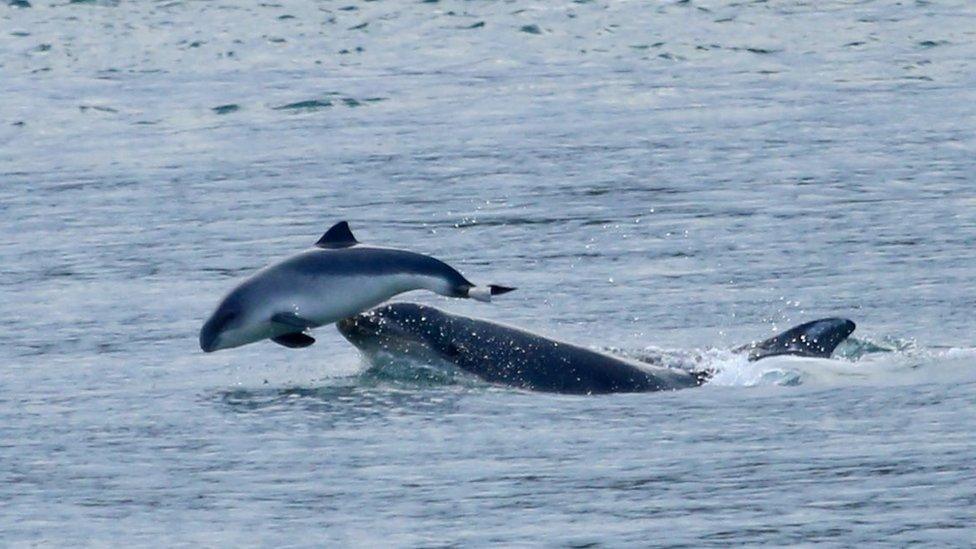
The dolphins' seemingly playful behaviour took a more sinister turn when they were seen to attack a smaller harbour porpoise
Mr Whooley said adult bottlenose dolphins can grow to weigh up to 200kgs and are "the size of a bull and as powerful".
He said people often forget this and jump into the water with dolphins, thinking they're "going to have this cosmic experience", but instead can potentially end up with serious injuries.
"We had one bottlenose dolphin down in County Clare called Dusty," he said.
"Every summer the Coastguard and the beach rescue work around the clock to get visitors not to swim with that dolphin because there is literally a caseload of incidents which have resulted from mild injuries all the way up to a German film-maker being medevaced back to Germany.
"He had massive internal organ damage.
"Another woman was seriously injured trying to hold on to its dorsal fin."
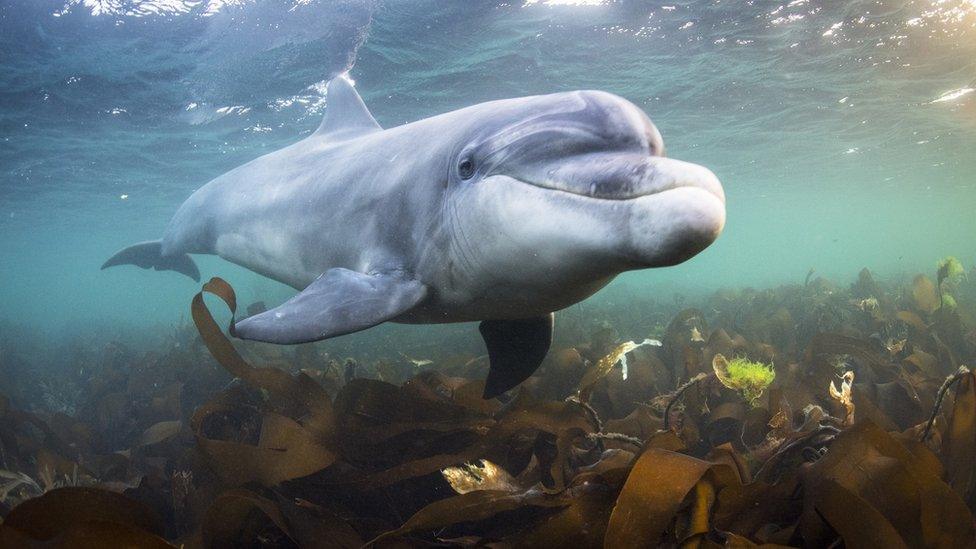
Bottlenose dolphins, like this one photographed off the coast of County Clare, are described as larges as a bull and just as powerful
While the seas around Ireland are full of life, it would be wrong to say there are no concerns.
Sea Deep NI is an Ulster Wildlife project to protect the sharks, skates and rays that inhabit Northern Irish waters.
The project catches, tags then releases the likes of flapper skates - which can be up to two and a half metres long, small spotted catsharks, and other small sharks such as spur dogs and bull huss, then collates the information.
"From that, if there are any major developments, say for windfarms, cable laying or something like that, these areas would be slightly better protected," one of its volunteers, Ronald Surgenor, said.
"The species make-up is definitely changing slightly. It used to be in the 70s, 80s, you'd have been getting lots of good-size fish and now just probably with overfishing and a multitude of different things, you're not getting those big fish coming inshore as mush as you used to."
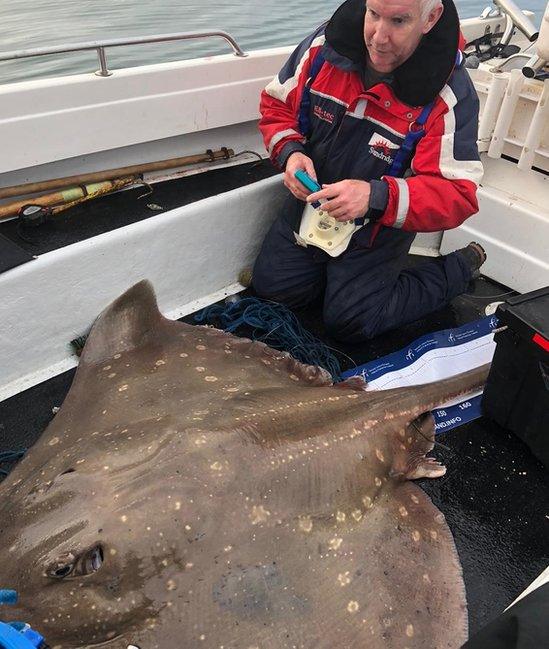
Ronald Surgenor tags a flapper skate
Commercial fishing threat
The IWDG's Pádraig Whooley said there is no single threat to whales and dolphins in Irish waters but they are concerned about the removal of small forage fish from the sea by big commercial boats.
"We need to be more mindful of what's happening to these small fish because even though we might think they're insignificant, they're the basis of the marine food chain, and if you start messing with that the big whales in particular - the likes of humpbacks and fin whales - they'll start very soon voting with their fins," he added.
He said climate change was also concerning because, as waters warm, predators could follow prey fish to cooler waters elsewhere.
For now, though, the opportunity is very much there for anyone who wants to see some of the sea's most amazing creatures in Irish waters.
"We're under the idea that to see interesting wildlife you have to go to exotic places - whales and dolphins are no different," Mr Whooley said.
"We're an island out in the middle of the Atlantic. We have extraordinary potential to observe these magnificent mammals right at home."